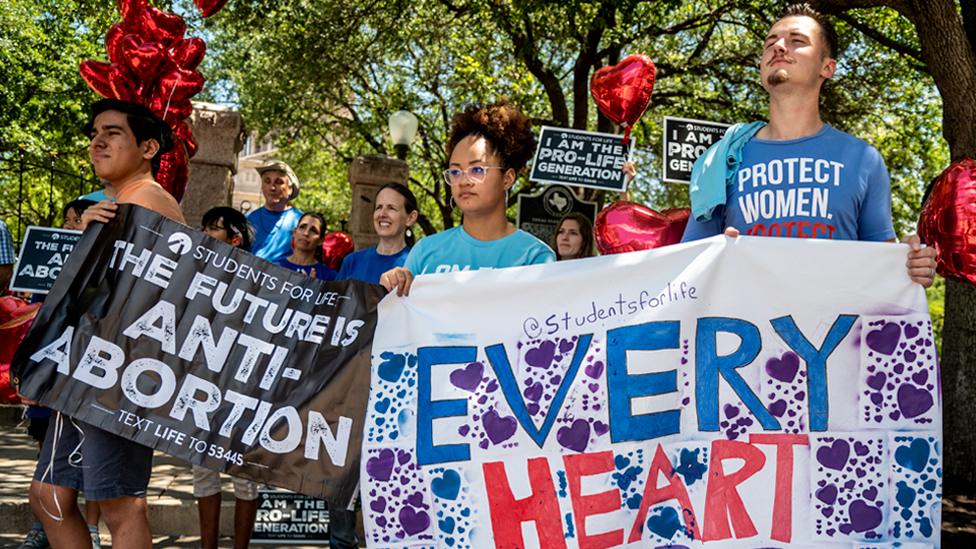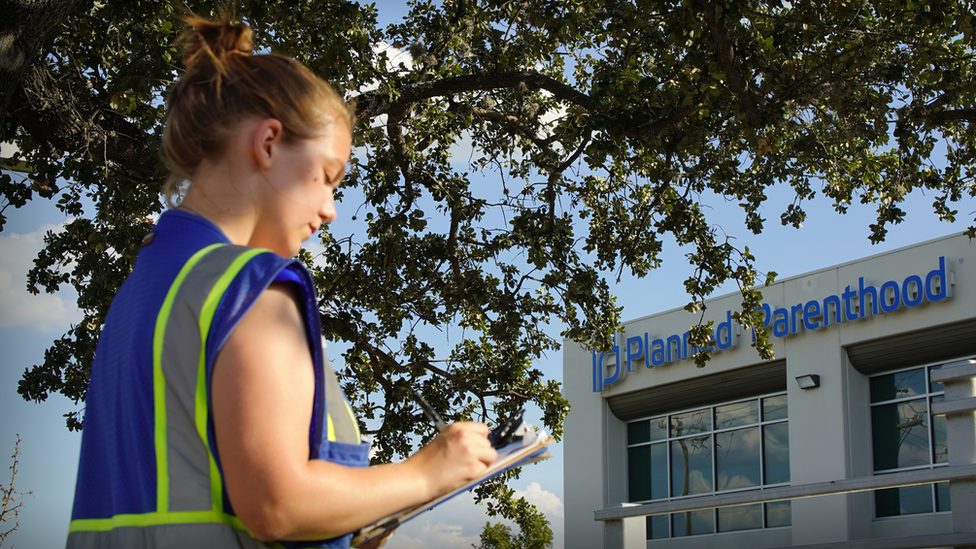Texas abortion law: The implications of the Supreme Court’s ruling
- Published

A landscape-shifting Supreme Court decision on abortion wasn't expected until next June, as the court spends the coming months weighing the merits of a Mississippi law limiting abortion rights. Instead, the legal lightning bolt came just before midnight on Wednesday.
In an unsigned ruling backed by a narrow 5-4 majority, the court justices allowed a Texas law banning all abortions after six weeks of pregnancy to go into effect.
The move stunned many legal observers and abortion-rights advocates, who were expecting the court to suspend the law until after the justices decided the Mississippi case.
As the judicial dust settles, here are five significant implications of the court's action.
Roe v Wade is on the ropes
Forty-eight years ago, in the landmark case Roe v Wade, the Supreme Court legalised abortion across the US, ruling that women have an unfettered constitutional right to the procedure during their first trimester (12 weeks) of pregnancy.
The court has occasionally chipped away at the right, upholding spousal and parent notification laws and allowing greater regulation of abortion providers, but by and large that precedent has held up.
In the half-century since Roe, however, there hasn't been a court majority as predisposed to ruling against abortion rights as this one.
Anti-abortion activists viewed the Mississippi case, which bans abortion after 15 weeks of pregnancy except in medical emergencies and cases of "severe foetal abnormality", as their greatest opportunity to strike down Roe. That would allow individual states to decide the legality of abortion in their individual jurisdictions, creating the sort of patchwork of laws that existed in the US before 1973.
While the court did not rule on the merits of the Texas law, the fact that five of the nine justices permitted it to go into effect - even though it could have a significant chilling effect on abortion providers and women seeking the procedure - suggests there is a functioning majority on the court ready to scrap Roe.
Anti-abortion activists aren't popping champagne corks yet, but an ultimate victory - one they've organised and laboured toward for decades - appears within their grasp.
A new legislative loophole
Just because the court declined to pass judgement on the merits of the Texas law doesn't mean the court's ruling won't have an immediate knock-on effect. Texas appears to have found a way around quick judicial review of constitutionally questionable laws.
The state law outsources enforcement of the abortion ban to private citizens, who can file lawsuits against abortion providers and individuals who "aid and abet" the procedure - collecting $10,000 (£7,230) in damages for each case they win. With no government official or entity enforcing the ban, the Supreme Court majority held, there's no one for opponents of the law to sue until those private cases start showing up in court.
President Joe Biden, in his statement reacting to the court's ruling, highlighted the court's response to the unusual construction of the Texas law in a scathing statement released on Thursday.
"Rather than use its supreme authority to ensure justice could be fairly sought, the highest court of our land will allow millions of women in Texas in need of critical reproductive care to suffer while courts sift through procedural complexities."
As the court does its "sifting", other Republican-controlled states, many of whom have already tried passing some form of abortion ban only to have them suspended by the courts, are already considering copying the Texas law
The tactic doesn't have to be limited to abortion, either. One can imagine liberal states passing legislation allowing citizen enforcement of handgun bans, global warming regulations or vaccine mandates.
The Supreme Court might ultimately slam the door on such a practice - it's hard to imagine the court allowing such a significant erosion of its powers of judicial review - but in the meantime, it's open season for states that have long been stymied by federal courts.
Mitch McConnell's triumph
If anti-abortion advocates are celebrating this week, they should take a moment to give thanks to Mitch McConnell of Kentucky. If it weren't for the Senate minority leader's procedural manoeuvring - and willingness to break with longstanding Senate precedent - this week's abortion ruling would almost certainly have gone the other way.
It was McConnell in 2016 who blocked Democrats from filling the seat of the late conservative Justice Antonin Scalia for nearly a full year in 2016, allowing Donald Trump to make the pick instead. McConnell also scrapped the Senate rule that required a 60-vote majority to confirm Trump's pick, circumventing Democratic attempts to block Trump's nominee.
Then, when liberal Justice Ruth Bader Ginsburg died last October, McConnell flipped from his 2016 position of not filling Supreme Court openings during an election year and used his Senate Republican majority to seat another Trump pick.
Both Trump-appointed justices, as well as a third who replaced retired Justice Anthony Kennedy (who had previously voted to uphold Roe), were among the five justices who let the Texas law go into effect.
The abortion battle explained in three minutes
If it wasn't for McConnell - or if Hillary Clinton had beaten Trump in 2016 - current conversations would be about a liberal court majority and constitutionally protected abortion rights for decades to come.
Justice John Roberts, the centrist
Once again, the Supreme Court's chief justice - appointed by Republican President George W Bush in 2005 - has sided with the court's liberals on a major issue.
Last term John Roberts signed on to a landmark case for gay and transgender employment rights and sided against efforts to protect Trump tax returns from criminal investigators. He also was the pivotal vote upholding Democratic healthcare reform in 2016 and Barack Obama's immigration protections for undocumented children in 2020.
Such rulings have sparked the ire of conservatives, many of whom view him as a political apostate.
Roberts is no liberal - his rulings in favour of corporate power and religious liberty prove that - but his high-profile votes have placed him decidedly in the ideological middle of the spectrum. If the balance of the court ever moves to the left - either by the death or retirement of a conservative justice while Democrats control the presidency and the Senate - Roberts could end up as the court's key swing vote.
Abortion on the ballot
For decades, abortion has been a more powerful motivating issue for conservatives than for liberals, if only because anti-abortion activists are the ones facing a legal landscape they desperately wanted to change.
If the Texas ruling is an indication that the court is poised to strike down Roe and allow states to ban abortion, however, that legal landscape will shift quickly and dramatically.
It will be abortion rights advocates who feel threatened - with fear frequently an effective motivating factor in getting people to the polls. With mid-term congressional elections just a year away, a candidate views on abortion rights will no longer be a theoretical discussion, with the ultimate fate of the procedure decided by the courts.
Legislators in states and US Congress will be casting votes on abortion laws that have very real implications for everyday Americans - and very real electoral implications.
For instance, Democratic voters in Texas, a traditionally conservative state that has trended to toward the left in recent elections, could take note of their legislature's sweeping efforts to reshape abortion law and flock to the polls next November. In other states, it could be conservatives who turn out to overturn abortion protections.
For decades both Republicans and Democrats have been saying "abortion is on the ballot". Some, particularly on the left, have shrugged that off. But if Roe falls, it will be hard to dispute such an assertion.
Related topics
- Published2 September 2021

- Published2 September 2021

